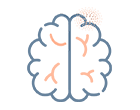Al Mutairi, F., Alfadhel, M., Nashabat, M., El-Hattab, A. W., Ben-Omran, T., Hertecant, J., Eyaid, W., Ali, R., Alasmari, A., Kara, M., Al-Twaijri, W., Filimban, R., Alshenqiti, A., Al-Owain, M., Faqeih, E., & Alkuraya, F. S. (2018). Phenotypic and Molecular Spectrum of Aicardi-Goutières Syndrome: A Study of 24 Patients. Pediatric neurology, 78, 35–40. https://doi.org/10.1016/j.pediatrneurol.2017.09.002
Rice, G., Patrick, T., Parmar, R., Taylor, C. F., Aeby, A., Aicardi, J., Artuch, R., Montalto, S. A., Bacino, C. A., Barroso, B., Baxter, P., Benko, W. S., Bergmann, C., Bertini, E., Biancheri, R., Blair, E. M., Blau, N., Bonthron, D. T., Briggs, T., Brueton, L. A., … Crow, Y. J. (2007). Clinical and molecular phenotype of Aicardi-Goutieres syndrome. American journal of human genetics, 81(4), 713–725. https://doi.org/10.1086/521373
Crow, Y. J. (2005). Aicardi-Goutières Syndrome. In M. P. Adam (Eds.) et. al., GeneReviews®. University of Washington, Seattle.
Crow Y. J. (2013). Aicardi-Goutières syndrome. Handbook of clinical neurology, 113, 1629–1635. https://doi.org/10.1016/B978-0-444-59565-2.00031-9
Kroner, B., Preiss, L., Ardini, M., & Gaillard, W. (2008). New Incidence, Prevalence, and Survival of Aicardi Syndrome From 408 Cases. Journal Of Child Neurology, 23(5), 531-535. doi: 10.1177/0883073807309782
Prontera, P., Bartocci, A., Ottaviani, V., Isidori, I., Rogaia, D., & Ardisia, C. et al. (2013). Aicardi Syndrome Associated with Autosomal Genomic Imbalance: Coincidence or Evidence for Autosomal Inheritance with Sex-Limited Expression?. Molecular Syndromology, 4(4), 197-202. doi: 10.1159/000350040
Sutton, V. R., & Van den Veyver, I. B. (2006). Aicardi Syndrome. In M. P. Adam (Eds.) et. al., GeneReviews®. University of Washington, Seattle.





